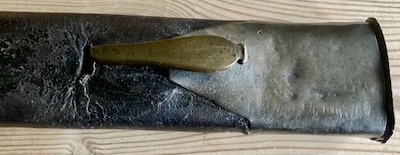I just got this saber blade at an antique/souvenir shop in, of all places, Cape Town (South Africa). Never was into late European military swords, but this was incredibly cheap and I bought it as a project blade to restore and re-handle (not necessarily in the original style, maybe as an earlier hanger or something).
It looks to me like a late XIX century original rather than a recent repro. Significant surface rust, some notches in the edge but not deep (under 1/32"), so I think I should be able to restore the edge and surface finish without losing too much steel (may have to leave some pitting in place to avoid going too thin).
Overall, it is a relatively short and light blade, probably just solid enough for actual combat use, not just parade. I would expect it to be mostly a cutting blade, as the point is rather thin and springy, not stiff enough for solid thrusting. But again, I am not really an expert.
My guess is it could have been an infantry or artillery officer's sword. Just not long or heavy enough for cavalry.
Would be interesting to find out what county / model of a sword it comes from. Any ideas?
Some pictures are attached (not perfect quality, sorry). Other details:
- blade length 26 3/4"
- width 1 3/16" at base, 1" at where false edge (which is 9 3/4" long and sharpened) starts
- thickness 1/4" and 1/8" correspondingly
- weight 13.5 oz (380g)
- pretty strong curvature (1 1/8" if measured like on Japanese swords)
- a wide fuller in the middle and a narrow one along the edge
- no decoration or marks, other than what looks like a deep oval stamp 5/8" long in the tang (can't make out anything in it, though)
- end of tang was peened (no thread). Tang is somewhat longer than I expected (6").
[ Download ]
[ Download ]
[ Download ]
